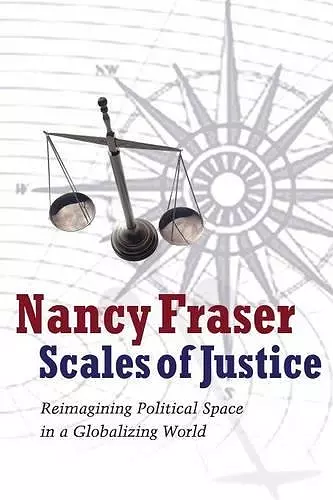Scales of Justice
Reimagining Political Space in a Globalizing World
Format:Paperback
Publisher:John Wiley and Sons Ltd
Published:28th Nov '08
Should be back in stock very soon
This paperback is available in another edition too:
- Hardback£55.00(9780745644868)

Until recently, struggles for justice proceeded against the background of a taken-for-granted frame: the bounded territorial state. With that "Westphalian" picture of political space assumed by default, the scope of justice was rarely subject to explicit dispute. Today, the scope of justice is hotly contested, as human-rights activists and international feminists join critics of structural adjustment and the WTO in targeting injustices that cut across borders. Seeking to re-map the bounds of justice on a broader scale, these movements are challenging the view that justice can only be a domestic relation among fellow citizens. As their claims collide with those of nationalists and Westphalian democrats, we witness new forms of "meta-political" contestation in which the scale of justice is an object of explicit dispute. Under these conditions, there is no avoiding an issue that had once seemed to go without saying: What is the proper frame for theorizing justice? Faced with a plurality of competing scales, how do we know which scale of justice is truly just?
Scales of Justice tackles this issue. Interrogating struggles over globalization, Nancy Fraser reconstructs the theory of justice for a post-Westphalian world. Revising her widely discussed theory of redistribution and recognition, she introduces representation as a third, "political," dimension of justice, which permits us to re-conceive scale and scope as questions of justice. Seeking to re-imagine political space for a globalizing world, she revisits the concepts of democracy, solidarity, and the public sphere; the projects of critical theory, the World Social Forum, and second-wave feminism; and the thought of Habermas, Rawls, Foucault, and Arendt.
"Scales of Justice makes an important contribution to rethinking democracy and offers tools for political experimentation. Such experimentation could add much to this project and extend Fraser's ideas further."
New Zealand Geographer
"Nancy Fraser breaks new ground in rethinking the meaning and consequences of justice in a globalized world. Building upon her earlier work on recognition and redistribution, she forcefully argues that we need to reimagine and reframe a political space of justice that transcends the domain of sovereign territorial states. As always, her essays are vigorous, fresh, lucid, and provocative. A must for anyone interested in the cutting edge of a critical theory of justice."
Richard Bernstein, New School for Social Research
"In this lucid and tightly argued book, Nancy Fraser raises the question of how to think about justice when the increasing salience of transnational and subnational processes makes state-centric conceptions of social justice less tenable than they ever were. A serious engagement with questions of this kind should be at the top of the agenda of anyone concerned with social justice, regardless of whether we agree or not with Fraser’s thoughtful answers."
Giovanni Arrighi, The Johns Hopkins University
"Combining conceptual clarity with political imagination, Nancy Fraser breaks new ground for a critical theory of justice in an era of globalization. On the basis of a comprehensive analysis of relations of injustice in three dimensions, she asks us to reconsider traditional conceptions of who owes what to whom. A much needed guide to the largely unknown territory of a just global order."
Rainer Forst, Goethe-Universität, Frankfurt am Main
ISBN: 9780745644875
Dimensions: 232mm x 160mm x 18mm
Weight: 397g
240 pages